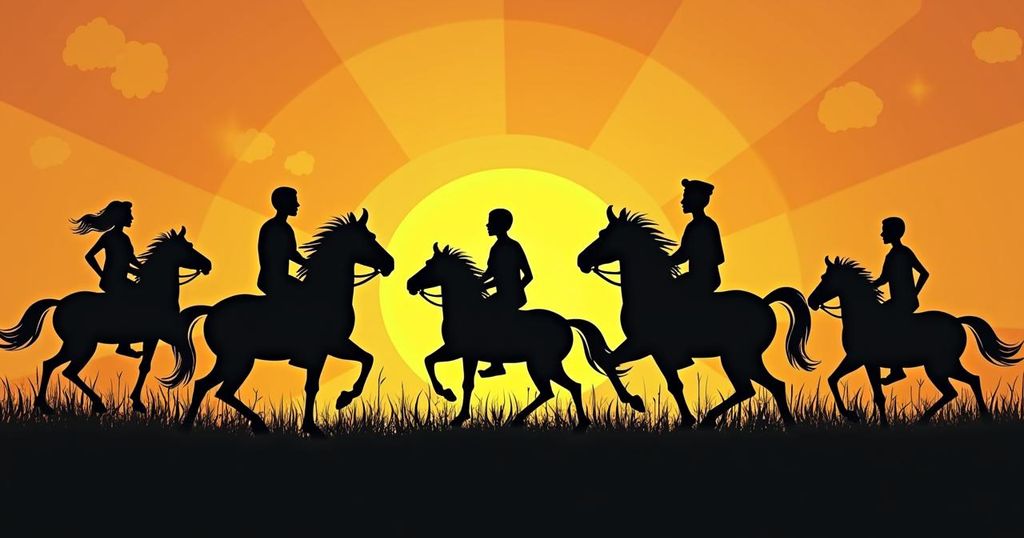South Africa’s Rugby Dominance: A New Era Under Rassie Erasmus
The South African rugby team, under Rassie Erasmus, currently holds all major southern-hemisphere trophies, including the Rugby Championship. Their recent victory over Argentina (48-7) displayed both their powerful scrum and enhanced precision in attack, distinguishing them from previous iterations of the team. Despite some second-half fatigue, their potent mix of established stars and new talent positions them as front-runners in the sport. As rugby’s future faces uncertainties, the Springboks embody the cultural significance of rugby in South Africa and seek to further solidify their dominance during an upcoming European tour.
In the realm of rugby, South Africa stands as a formidable force, currently holding every prestigious trophy available to southern-hemisphere teams, including two World Cups, the British & Irish Lions series, and the Rugby Championship. This extraordinary feat invites comparison to the legendary All Blacks of Richie McCaw and Dan Carter, although such discussions are best reserved for lively debates over a pint of ale. The evolution of the Springboks under the guidance of Rassie Erasmus has indeed positioned them favorably, raising questions about their future accomplishments. Their decisive victory against Argentina, with a score of 48-7, exemplified the hallmarks of a quintessential Springboks performance. Prop Ox Nché, with his cheeky remark that “salads do not win scrums,” dominated the set piece, single-handedly earning multiple penalties in the first half. Veteran Eben Etzebeth, now boasting 128 caps, exhibited unwavering determination, showcasing his leadership and skill throughout the match. Pieter-Steph du Toit, playing through physical challenges, contributed significantly by scoring two tries and commanding the breakdown. However, it is the enhanced offensive capability of this team that warrants attention. Unlike previous versions that relied on brute force, this squad has refined their approach, exhibiting a surgical precision that can dismantle opponents. Having newly asserted their dominance over an Argentina team that previously triumphed over New Zealand and handed Australia a record loss, the Springboks have signaled their intentions for continued supremacy as they prepare for the upcoming World Cup cycle. Notably, the presence of Cheslin Kolbe on the right wing adds a dynamic edge, competing closely with Antoine Dupont for the title of the world’s best player. Kolbe’s explosive pace provides a constant threat, while fly-half Manie Libbok, despite his kicking inconsistencies, showcases impressive ball-handling and creativity, redefining the role of the South African playmaker—previously a troublesome figure for South Africa who now proudly dons the green jersey. Acknowledging their performance, one notes that South Africa’s intensity waned after halftime, possibly due to fatigue from their recent World Cup triumph achieved through narrow victories. Conversely, Argentina merited commendation for their resilient performance, transitioning under the direction of Felipe Contepomi, who has fostered an atmosphere of confidence. In the past, such a halftime deficit would have foreshadowed a rout; however, today, the Argentine team addresses adversity as a chance for growth, incorporating strategies honed in the international sevens circuit. Looking forward, there are clouded prospects for rugby as its future teeters on discussions for annual bilateral series between New Zealand and South Africa, risking relegation for teams such as Australia and Argentina in the quest for profitability. With Australia set to host significant events, including the British & Irish Lions series and both men’s and women’s World Cups, and with Argentina embracing new leadership, these circumstances pose challenges for a sport dependent on a limited number of vibrant nations. In South Africa, rugby transcends sport to become a cultural phenomenon—the players revered and celebrated, their victories interwoven within the socio-political tapestry of the nation. Etzebeth has aptly described rugby in South Africa as a “religion.” The central ambition remains clear: as Erasmus articulated, the team’s focus is to “keep the main thing the main thing.” This steadfast commitment, coupled with a blend of grit and finesse, positions them to maintain their winning trajectory, eagerly anticipating an upcoming European tour in November to further solidify their claim as the world’s premier rugby team.
South Africa’s rugby team, the Springboks, has achieved remarkable success in recent years, securing key titles such as two World Cups and the Rugby Championship, under the strategic leadership of Rassie Erasmus. Their latest performance against Argentina showcased not only their power but also an evolving style of play that combines strength with precision. The context of rugby in the southern hemisphere is marked by intense competition, particularly among teams like New Zealand, Australia, and Argentina, each striving for dominance within an uncertain landscape of future tournaments and international relations. The social significance of rugby in South Africa further enriches the narrative, transforming players into cultural icons who reflect broader societal narratives.
In summary, the South African rugby team has reached a pinnacle of success, characterized by their current possession of all major southern-hemisphere trophies, a development that invites comparison to the All Blacks’ legacy. Their comprehensive victory over Argentina not only highlighted established talents like Ox Nché, Eben Etzebeth, and Pieter-Steph du Toit but also demonstrated their refined approach to gameplay. As discussions arise concerning the future of rugby, particularly regarding potential sidelining of teams like Argentina, the Springboks continue to exemplify the sport’s power and cultural significance in their homeland. With a critical European tour on the horizon, their pursuit of excellence remains steadfast, poised to enhance their already illustrious standing in the rugby world.
Original Source: www.theguardian.com




Post Comment